- Home
- Patrick Robinson
Kilo Class (1998) Page 6
Kilo Class (1998) Read online
Page 6
“Too fucking late is how we found out. You wouldn’t believe this, Joe, but I had not vacated my chair at Fort Meade for more than an hour and a half when some brain-dead asshole gets a hold of a report from the satellite that suggests a Kilo Class submarine is on the move, on a freighter, from St. Petersburg. They alert the Defense Secretary, and the office of the Secretary of State and presumably someone here or hereabouts.”
“Not me,” said Admiral Mulligan.
“Anyway they have a very high level conference and decide the Kilo is probably going to the Middle East or Indonesia, especially as they seemed to think the freighter carrying it might be Dutch. Decided there was not much we could do about it anyway, and let the matter rest.
“Do you guys know what they shoulda done? They shoulda said ‘CHINA’—and gone out and sunk the motherfucker. That’s what they shoulda done.”
“Yeah. Good idea, Arnie,” said Admiral Mulligan. “That is what they shoulda done.”
“Delivery of these bastards is a goddamned absolute. The Chinese either get ’em, or they don’t get ’em, right?” The Admiral was not pleased.
“Without telling you the whole story,” he continued, “we then had to track the damned thing right across the Indian Ocean. We watched her enter the Malacca Strait, which as you know is a darned long bit of water—divides the entire thousand-mile-long coast of Sumatra from the Malaysian Peninsular. It’s really the gateway to the east, and we have a kinda sentry right in there. You don’t need to know exactly who, or how, but we have friends…well, employees anyway…guys who specialize in this type of stuff.”
“Couldn’t be anything to do with the requirement for pilotage past Singapore, could it?” asked Admiral Mulligan, an eyebrow slightly raised.
“In this case, the least said, Joe…Anyway, once she gets through there, and steers northeast, she’s into the waters of the South China Sea. It’s fifteen hundred miles, around four and a half days for a big freighter making fifteen knots, and she’s right off the first Chinese Naval Base. That’s Haikou, on their southern island of Hainan. We’re guessing that’s the freighter’s first stop, and it’s too damn late for us to do anything about it. We can’t just take the fucker out, not in front of the whole goddamned world, right on China’s front doorstep. I told Fort Meade this morning they should expect some kind of a Chinese escort from the Southern Fleet to come out and meet her, and then accompany her right into Haikou. Devious Chinese bastards.”
“Glad to see you’re mellowing some, Arnold,” observed the CNO with a grin.
“I cannot see one thing to be mellow about,” said Admiral Morgan. “Neither can I see how the hell this one got through the net. But I’m going to find out and there’s gonna be big fallout in my old department by next week. Christ! This’ll be China’s third Kilo. It better be their goddamned last.”
Joe Mulligan shifted in his chair. “You know, Arnold,” he said, “I just wonder whether you’re not getting overexcited about these Kilos. I mean, are they really so important? It’s a medium-size, kinda slow, kinda basic ex-Soviet design with a limited endurance. If I knew where they were, I could probably wipe out three of ’em in as many minutes.”
“CNO,” said Admiral Morgan formally, “you could probably wipe out ten of them, if you knew precisely where they were. But remember, they are diesel-electrics, not nuclears, and at under five knots they are silent. And we expect them to be working close to their base, in what are extremely difficult, shallow waters, where our antisubmarine capability is least.”
“Well, Boomer here had a successful run-in with one of ’em, didn’t he?”
The Captain of Columbia looked up. “Only once with a Kilo, and I’d have to say that boat was dead quiet at less than seven knots. We only picked him up originally because he was snorkeling in deep open water. So at least we had an accurate position and fire-control solution on him. But when he stopped his diesels, and went silent on his electric motor, he was impossible to hold except on active.
“We had picked up fairly clear engine lines passive at about twelve miles, but once he stopped running his diesels the real problem started. Fortunately we were ready for that. But if he is not going to be decent enough to run those engines, the problem never even begins. And we are in all kinds of trouble.”
“Exactly,” growled Admiral Morgan. “They are bastards to find if they are going slowly, and out there in the China seas, they can go as slowly as they like. They’ll only need to recharge their batteries every three or four days, and we’ll never get a handle on them.
“All the way up that Chinese coast—South China Sea, Taiwan Strait, East China Sea, right up to the Yellow Sea—the place is nothing but naval bases. They have ’em everywhere. From Haikou and Zhanjiang in the south right up through Canton and Shantou. Then we got the East Sea Fleet with an expanding base at Xiamen—dead opposite Taiwan—another one at Ping Tan, which is less than a hundred miles across the strait from Taipei. And then they got bases at all stops north to Shanghai, and the big submarine shipyards at Huludao, which is damn nearly in Manchuria.”
Admiral Morgan paused, gathering his thoughts, assuming as always that everyone else knew as much as he did about the world’s navies. Then he spoke.
“If the Chinese get those Kilos in place, they will cause havoc if they want to. It will be impossible to protect our interests in Taiwan because we’ll be living in fear of losing another big carrier. And I don’t think anyone would be able to deal with that.”
“She does pack a bit of a punch, too. We know that,” mused Admiral Mulligan.
“Well, we know it can deliver a torpedo sophisticated enough to carry a nuclear warhead. And that’s pretty damn dangerous,” answered Morgan. “Chinese technology can actually provide that. I don’t know if they’d use such weapons, but could we ever be sure? Their other, conventional-headed torpedoes are quite bad enough to send our carriers home. I guess we could hit two or three of them in retribution if they did hit us, but Jesus! That’d be a bit fucking late in my view. The fact remains the Kilo can literally vanish if it’s being handled by a top man. And as we know, it can pack a terrific wallop.”
“And the Russians have been improving them all the time, I guess,” said Mulligan.
“Yes. Even for export. This sonofabitch is their big chance to keep making big bucks, and they want to please their clients. What’s more, just to make your day, I also read somewhere they have a couple of improvement programs in place. The new Type 877EKM has significantly better weapons systems—two tubes that can now fire wire-guided torpedoes…. advanced, new torpedoes, which the goddamned Russians are quite likely to supply.
“And I guess I told you the new Type 636 Kilo has an automated combat information system. Allows them to place simultaneous fire on two targets. They have never been able to do that before. And the fucking thing is even quieter now, if that were possible.”
“Beautiful. Just what we need in the Strait of Taiwan. But maybe it’s not really such a surprise, Arnie. That’s what they have worked on for all of their submarines these past few years. Somehow they’ve found the money, and they now have a few good nuclear boats that are supposed to be quieter than ours. I expect they developed the Kilo improvements at the same time. Basically, the clients of Moscow are tin-pot nations who either hate us or don’t much like us. Or, in the case of the Chinese, want to be as powerful as we are.
“Whatever the Russians say, they have built the Kilo to please those clients, like Iran, Libya, and a variety of not-too-competent operators. The Chinese order represents a major change in policy by the Russians and gives us a serious problem. It seems we are not going to be able to persuade them not to fulfill the China order. Nor are we going to persuade the Chinese to back off. Those last seven diesel-electrics will get to Shanghai, and then to Xiamen, right on the Taiwan Strait. Whether we like it or not.”
The room was very still for all of a half minute. Then Vice Admiral Arnold Morgan spoke. Slowly.
�
�No, Joe. No they’re not,” he said.
And the tone was not menacing. It was uttered as a simple statement of opinion. Boomer Dunning felt a chill run right through him. Now he knew for certain precisely why he was in this particular room. He betrayed no emotion. But he glanced up at the CNO, who remained expressionless. Boomer thought he noticed the smallest perception of a nod.
“I speak in this way because I believe we are never going to persuade the Russians to give up that order. They’ve got too much riding on it. Not just cash.”
“How d’you mean exactly?” asked Admiral Mulligan.
“Well, right here we have another development, Joe. You remember that Russian aircraft carrier the Admiral Kuznetzov?”
“Sure. It’s their main surface ship in the north, isn’t it? Not so big as a Nimitz, nor even a JFK or an Enterprise Class of ours. But still big, close to a thousand feet long I thought?”
“You thought right. She’s big, she’s dangerous, and the Russians had decided to build a whole class of them. However when the entire house of cards caved in round about 1993, and they simply could not afford to continue such grandiose plans, they found themselves stuck with a couple of fucking great carriers, both half-finished, in a shipyard in the Ukraine they no longer even owned. By this time they were just about bust. Terrible things happened—like the town threatened to cut off the power supply to the shipyard. No one was getting paid, and naturally the new carriers were more or less abandoned.”
“Jesus. Yeah, I remember. Remind me, what were they called?”
“There was the Varyag, which I think they got rid of locally, and there was the Admiral Gudenko. And she’s still sitting right there at the Chernomorsky Shipyard in Nikolayev while the governments of Russia and the new Ukraine argue about who owns her, and who’s going to pay for her completion. The answers to both questions are the same: no one. Which has been a major blow to the local shipbuilding industry. People ended up almost starving in that town.”
“And?”
“Not much happened for a long time. The Admiral Gudenko had been launched, but she was covered in scaffold, and they eventually moved her out to one of the unused piers in the south of the yard, where no one much goes. Then someone had a brainstorm—let’s sell her to some country that will pay for her completion. Who was the first name on the list?”
“China, as we know.”
“Right. They wanted her, but they could not really afford her, thank Christ. And again things went a bit quiet. But we just learned yesterday that terms have finally been agreed, and China will buy the Admiral Gudenko, for around two billion US dollars. Which you can guess is sensational news all around in Nikolayev and effectively puts the yard right back in business. We learned, however, that there is one condition on which this huge order depends.”
“Oh no,” groaned Joe Mulligan. “They gotta deliver the last seven Kilos?”
“You got it.”
Admiral Mulligan shook his head. “I assume the State Department is pulling all its strings?”
“Sure are. Travis had the Russian ambassador and two Naval attachés in there early this morning. Read ’em a kind of velvet-coated riot act. I understand he was planning to try all kinds of persuasion, trade agreements, and God knows what else. I also understand that none of it worked.”
“Bob MacPherson was talking to someone in Moscow round about the time I was leaving for Norfolk,” Admiral Mulligan said.
“I had a talk myself with an old sparring partner in the Russian Navy at 0400 this morning,” added Morgan. “Admiral Vitaly Rankov. Used to be head of their Intelligence. He’s pretty high up in the Kremlin now, and he knew all about the problem. Even said if it was left up to him, he would not risk alienating the United States by fulfilling that order for the Kilos. Unhappily, it is not left up to him.”
“Arnold, what do you think the chances are of dissuading the Russians?”
“I think we might have a shot at stalling them for a short time, while we talk about it some more. But in the end no Russian president is going to risk the wrath of the entire Ukrainian nation by scuttling the Chinese order for the big carrier. I’d say the completion of the Admiral Gudenko represents a kind of Slavic ‘mission critical.’
“They gotta build the fucking Kilos. Whatever we might say. Also, I hear the Chinese are paying three hundred million US dollars each for those boats. That’s a hell of a lot of dough for an impoverished Russian shipping industry. We know at least two of them are almost ready for delivery—the ones up near Murmansk—and five more are under construction, in two different yards.”
Joe Mulligan frowned. “I don’t suppose the situation is helped any by the endless bullshit between Russia and Ukraine over the remnants of the Black Sea Fleet. It’s been going on for ten years, and in my view will keep on going until the ships rust to bits. I can’t think of a single thing they ever managed to agree on except that Russia will somehow lease the big base at Sevastopol, and the Ukrainians will build some kind of a headquarters up in Balaclava Bay.”
“You’re right, Joe. Ever since Ukraine decided to put together a Navy of her own, we hear every few months about a major agreement between the two Navies. Then it gets blown out of the water by the politicians. Moscow and Kiev, deadlocked again. Right here we have two near-penniless countries arguing like hell over warships neither of ’em can afford to run.”
“That’s correct, Arnie. But they both know they have to preserve a spirit of goodwill and cooperation. And I agree with you: that aircraft carrier project with the Chinese in Nikolayev will go ahead. The only way either Navy can survive is to export ships for cash.”
“Right. And the most commercial property is the Kilo Class submarine. Every Third World despot wants one. Or three.”
“Or ten.”
Just then the telephone rang and the call was for Admiral Morgan. He picked it up, and both Admiral Mulligan and Commander Dunning suppressed laughter as the new NSA rasped, “Yeah right, George. Forget the geography lesson. I know where the fucking place is…” Morgan then regained his composure and demanded, “Give it to me straight and quick, George. No bullshit. We are dealing right here with the topic of the week, if not the year.”
“Yeah…right…fuck it.” At which point Admiral Morgan replaced the receiver and, turning to the CNO, reported, “That was about that damned freighter we spotted in the Malacca Strait.
“She’s under escort running northeast, about four hundred miles into the South China Sea. We got some decent measurements on her. Whatever’s under the cover on the deck is exactly two hundred and forty feet long, the exact length of a Kilo.
“They put one over on us this time. Still, we couldn’t have done much about it, save for instigating an act of war. You wanna nail a submarine, you wanna get the sonofabitch under the water. That way there’s less chance anyone knows what the hell’s going on.”
“Anyhow,” said Joe Mulligan, “the Chinese now have three Kilos. And there’s not a whole lot we can do about that. I suspect our new preoccupation will be the other seven. And since we are almost certainly looking at a potential Black Operation, I suggest we give ’em a name. The two at Pol’arnyj…right now I guess they gotta be K-4 and K-5.”
It now occurred to Boomer Dunning that Columbia was being designated the Black Ops submarine in the US Navy—the one no one knew about, not where it was, or where it was headed. That way, if it disappeared, it would be a long time before its demise became common knowledge. Maybe never, since most of the time its whereabouts were unknown anyway. Boomer’s thoughts began to wander out to the deep dark waters in which he and his team operated on behalf of this nation. The sudden voice of Arnold Morgan took him by surprise.
“I’d say we’ve just about reached the point where we’re gonna need a plan,” he was saying. “Since Boomer here is the man we want to carry out the operation I guess he might as well start work on it.”
“Right, sir,” said Boomer. “As far as I can see there are three quite
definitive possibilities. One: the submarines have never dived, therefore the Chinese crews and their Russian advisers are planning to head home on the surface, which makes life very simple for us. Two: they plan to dive the boats in the not-too-distant future, then spend around three weeks training for basic safety and operational procedures, and head home probably dived some of the way. Not much of a problem there for us either.
“Three: the Chinese plan to wait out the winter working up in the Barents Sea, which does not freeze, and then head home as a fully operational, combat-ready unit, prepared to fight and defend against any enemy. I don’t like this last possibility nearly so much.”
“You got it, Boomer,” said Admiral Morgan. “You got it right there. If it’s number one, we don’t have a problem. We can catch ’em anywhere down the Atlantic. If it’s two we’ll have to keep our eyes open and have Columbia on station ready to strike. If it’s three, that’ll just be two to the power of ten. Meantime, if it’s okay with you, Joe, I’d like Boomer to work on that—the trap for K-4 and K-5. I just don’t want one more of those damn things to reach Chinese waters. Three’s all they’re getting.”

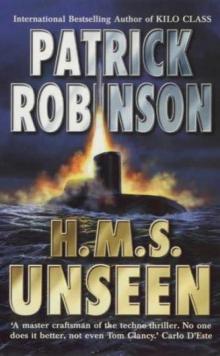 H.M.S. Unseen am-3
H.M.S. Unseen am-3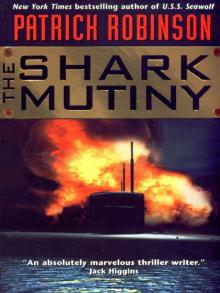 The Shark Mutiny (2001)
The Shark Mutiny (2001) Hunter Killer am-8
Hunter Killer am-8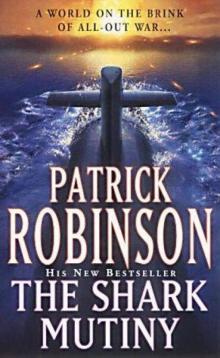 The Shark Mutiny am-5
The Shark Mutiny am-5 Scimitar SL-2
Scimitar SL-2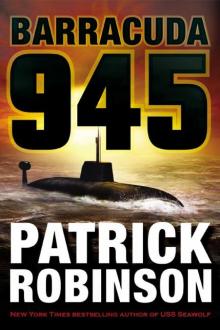 Barracuda 945 am-6
Barracuda 945 am-6 Hunter Killer
Hunter Killer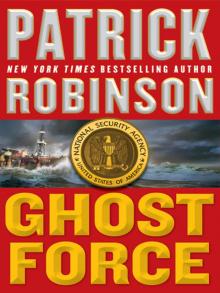 Ghost Force
Ghost Force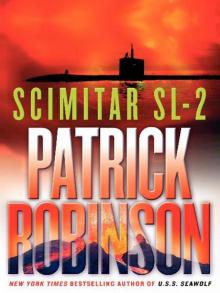 Scimitar SL-2 (2004)
Scimitar SL-2 (2004)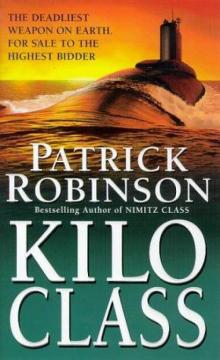 Kilo Class am-2
Kilo Class am-2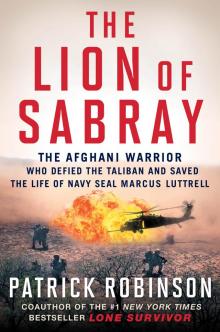 The Lion of Sabray
The Lion of Sabray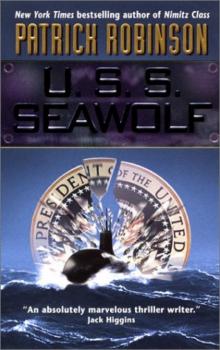 U.S.S. Seawolf am-4
U.S.S. Seawolf am-4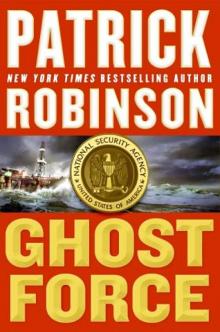 Ghost Force am-9
Ghost Force am-9 To the Death am-10
To the Death am-10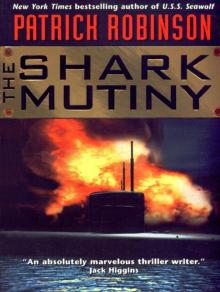 The Shark Mutiny
The Shark Mutiny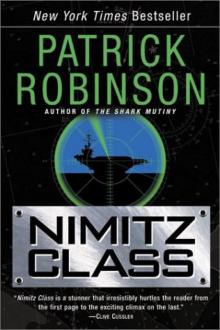 Nimitz Class am-1
Nimitz Class am-1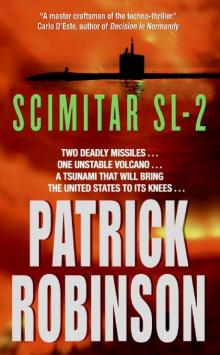 Scimitar SL-2 am-7
Scimitar SL-2 am-7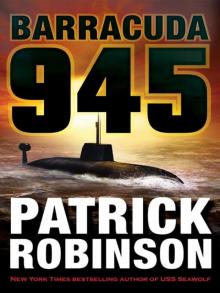 Barracuda 945
Barracuda 945 Intercept
Intercept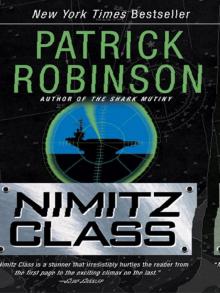 Nimitz Class (1997)
Nimitz Class (1997)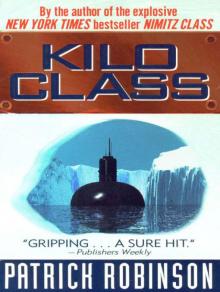 Kilo Class
Kilo Class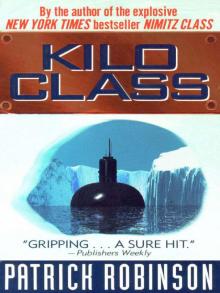 Kilo Class (1998)
Kilo Class (1998) Diamondhead
Diamondhead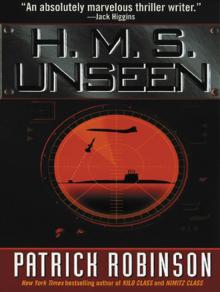 H.M.S. Unseen
H.M.S. Unseen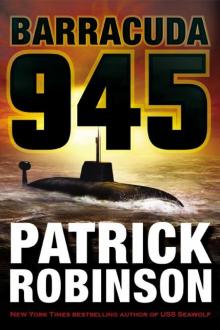 Barracuda 945 (2003)
Barracuda 945 (2003)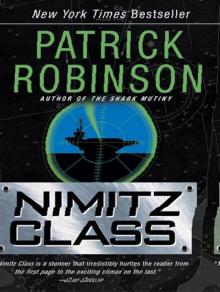 Nimitz Class
Nimitz Class The Delta Solution
The Delta Solution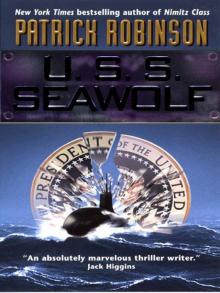 U.S.S. Seawolf
U.S.S. Seawolf